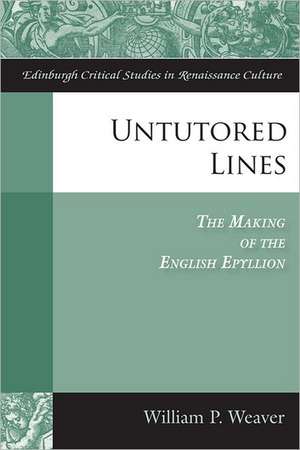Untutored Lines: Edinburgh Critical Studies in Renaissance Culture
Autor Professor William P. Weaveren Limba Engleză Hardback – 30 apr 2012 – vârsta de la 22 ani
Din seria Edinburgh Critical Studies in Renaissance Culture
- 21%
 Preț: 553.07 lei
Preț: 553.07 lei - 18%
 Preț: 552.29 lei
Preț: 552.29 lei - 11%
 Preț: 160.44 lei
Preț: 160.44 lei - 9%
 Preț: 165.31 lei
Preț: 165.31 lei - 11%
 Preț: 158.64 lei
Preț: 158.64 lei - 11%
 Preț: 187.85 lei
Preț: 187.85 lei - 18%
 Preț: 583.86 lei
Preț: 583.86 lei -
 Preț: 134.13 lei
Preț: 134.13 lei -
 Preț: 131.12 lei
Preț: 131.12 lei - 14%
 Preț: 521.79 lei
Preț: 521.79 lei -
 Preț: 134.76 lei
Preț: 134.76 lei - 14%
 Preț: 554.46 lei
Preț: 554.46 lei - 14%
 Preț: 555.24 lei
Preț: 555.24 lei - 11%
 Preț: 160.87 lei
Preț: 160.87 lei - 18%
 Preț: 583.07 lei
Preț: 583.07 lei - 18%
 Preț: 553.07 lei
Preț: 553.07 lei - 19%
 Preț: 645.98 lei
Preț: 645.98 lei - 18%
 Preț: 553.07 lei
Preț: 553.07 lei - 18%
 Preț: 554.38 lei
Preț: 554.38 lei - 19%
 Preț: 649.87 lei
Preț: 649.87 lei - 18%
 Preț: 554.38 lei
Preț: 554.38 lei
Preț: 554.23 lei
Preț vechi: 676.89 lei
-18% Nou
Puncte Express: 831
Preț estimativ în valută:
106.09€ • 115.27$ • 89.17£
106.09€ • 115.27$ • 89.17£
Carte disponibilă
Livrare economică 31 martie-14 aprilie
Preluare comenzi: 021 569.72.76
Specificații
ISBN-13: 9780748644650
ISBN-10: 0748644652
Pagini: 232
Dimensiuni: 155 x 236 x 23 mm
Greutate: 0.57 kg
Editura: EDINBURGH UNIVERSITY PRESS
Seria Edinburgh Critical Studies in Renaissance Culture
ISBN-10: 0748644652
Pagini: 232
Dimensiuni: 155 x 236 x 23 mm
Greutate: 0.57 kg
Editura: EDINBURGH UNIVERSITY PRESS
Seria Edinburgh Critical Studies in Renaissance Culture
Notă biografică
William P. Weaver is an assistant professor of literature in the Honors College of Baylor University, where he teaches Great Texts. His articles on Renaissance poetry and rhetoric have appeared in Shakespeare Quarterly, Studies in Philology, Spenser Studies, and Rhetorica.
Cuprins
Acknowledgements; Introduction; Rites of passage; Scenes of performance: 1. Progymnasmata: Humanist Rites of Passage; The progymnasmata as an introduction to the art of rhetoric; Disciplinary boundaries in the English grammar school; Literary exercise between the disciplines; From discursive plenitude to disciplinary correction; Part I. Rudiments of Eloquence: Boyhood; 2. Fabula: Observing 'Amorous Rites' in Hero and Leander; Musaeus among the rudiments of eloquence; Marlowe's paraphrase; Leander in the scene of culture; Puberty rites and the English epyllion; 3. Chreia: Making Themes in Venus and Adonis; Boyhood study; Boyhood style; 'The lesson is but plain'; Venus' frustrated banquet; 4. Narratiuncula: Coming of Age in Oenone and Paris; Vivid narration; Paris at the crossroads; Paris in the upper forms; Irony, pathos, and the 'courteous reader'; Part II. First Exercises: Adolescence; 5. Narratio and Confirmatio: Forensic Performance in Lucrece; Adolescent study and style; Lucrece's narratio; Night, opportunity, and time; Troy and the perjured self; Lucrece's confirmatio; 6. Encomium: Antinous as Lord of Misrule in Orchestra; Aphthonian man; Tedious praise; Misrule; Poetic rule; 7. Thesis: Controlling Speech in Cephalus and Procris; 'Methinks the man amendeth the matter much'; Man, horse, and dogs; On contrarieties he answer made; Secret muse; Epilogue: Jesus' First Exercises in Paradise Regained; Appendix; Notes.
Recenzii
William Weaver's book is a learned contribution to the growing reinvestigation of humanist pedagogy. He draws much-needed attention to an under-examined, but influential, school text - Aphthonius's Progymnasmata - in ways that deepen our understanding of the connection between rhetorical training and masculinity in Ovidian minor epics. -- Lynn Enterline, Vanderbilt University This book offers a highly original rewriting of the so-called minor epic in the Renaissance, linking it to the rite of passage in the humanist school while offering arresting observations on everything from Shakespearean sources to the reception of Ovid in the English Renaissance. A must read for historians of rhetoric, education, and early modern literature. -- Craig Kallendorf, Texas A&M University William Weaver's book is a learned contribution to the growing reinvestigation of humanist pedagogy. He draws much-needed attention to an under-examined, but influential, school text - Aphthonius's Progymnasmata - in ways that deepen our understanding of the connection between rhetorical training and masculinity in Ovidian minor epics. This book offers a highly original rewriting of the so-called minor epic in the Renaissance, linking it to the rite of passage in the humanist school while offering arresting observations on everything from Shakespearean sources to the reception of Ovid in the English Renaissance. A must read for historians of rhetoric, education, and early modern literature.
